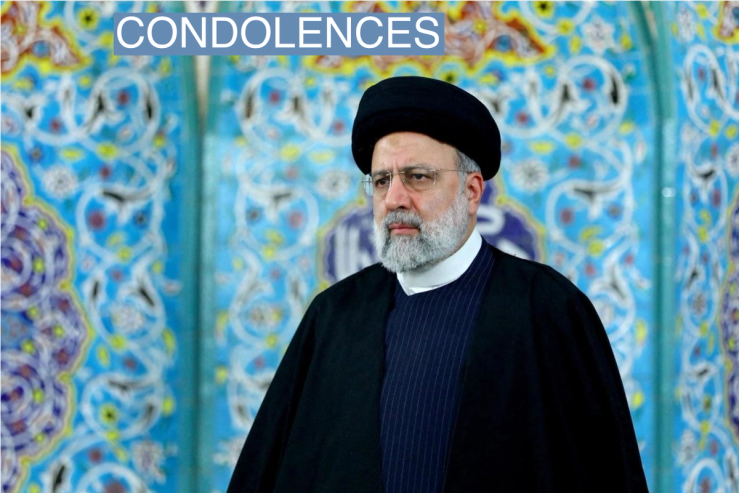The News
The US and European Union offered condolences to the Iranian government following the deaths of President Ebrahim Raisi and his foreign minister in a helicopter crash in a mountainous region of northwest Iran on Sunday, sparking criticism from human rights activists.
This outreach from Washington and Brussels on Monday offered a clear sign of the West’s desire to maintain a diplomatic line to Tehran at a time of enormous instability in the Middle East. US and European officials have been holding discussions with Iranian counterparts in recent weeks to try and prevent the war between Israel and Hamas from spreading further across the region. Iran and its proxies have backed Hamas in its battle both through direct attacks on Israel and strikes on US military interests in Syria, Iraq, Jordan and the Persian Gulf.
US and European officials told Semafor that they’re also eager to keep a line open to Iran at a time of enormous political change in the oil-rich country. Raisi had been a leading candidate to replace Iran’s paramount ruler, Supreme Leader Ayatollah Ali Khamenei, who’s 85 and suffering from cancer. Raisi’s death is expected to unleash enormous political infighting in Tehran, both over who will replace him as president and also who will be positioned to become the next supreme leader.
“The United States expresses its official condolences for the death of Iranian President Ebrahim Raisi, Foreign Minister Amir-Abdollahian, and other members of their delegation in a helicopter crash in northwest Iran,” the State Department said in a statement released Monday. “As Iran selects a new president, we reaffirm our support for the Iranian people and their struggle for human rights and fundamental freedoms.”
White House national security spokesman, John Kirby, added on Monday, in reference to Raisi: “No question, this was a man who had a lot of blood on his hands. That said, as we would in any other case, we certainly regret, in general, the loss of life and offered official condolences as appropriate.”
The EU said in its statement that it “expresses its sympathies to the families of all the victims and to the Iranian citizens affected.”
A number of prominent Iranian human rights activists criticized the Biden administration and EU for offering condolences for a man widely accused of exacting massive human rights abuses over the past four decades, in which the 63-year-old held a number of senior posts. The late president was known by his critics as the “Butcher of Tehran” for his role in helping the Islamic Republic execute thousands of its political opponents in a bloody purge in the late 1980s. Raisi also oversaw a harsh crackdown on protests sparked by the 2022 killing in custody of a young Iranian woman, Mahsa Amini, who was accused of violating the country’s stringent law that requires all women to wear Islamic headscarves.
“Ebrahim Raisi’s legacy is 4 decades of death and atrocities, at home and abroad,” the actress and human rights activist, Nazanin Boniadi, tweeted on Monday in response to the EU’s statement of condolence. “You are on the wrong side of history.”
A second US-based activist, Masih Alinejad, wrote: “Your sympathy and condolences are a slap in the face to us, the Iranian women who faced the brutality of Raisi and his regime.”
In this article:
The View From Iran
Supreme Leader Khamenei announced on Monday that Raisi’s deputy, First Vice President Mohammad Mokhber, would serve as caretaker until new presidential elections can be held in late June. Tehran’s chief nuclear negotiator, Ali Bagheri Kani, will serve as acting foreign minister. Khamenei also announced a five-day mourning period.
But the Iranian government didn’t specify what caused Raisi’s helicopter to go down. State officials had said on Sunday that the mountainous region near the Azerbaijan border where the president and his entourage disappeared was enveloped in fog from a storm front. And the president’s Bell helicopter was from an aging American-made fleet that dates back to the 1970s when Iran’s last monarch, Shah Mohammad Reza Pahlavi, served as the US’s closest military ally in the Middle East.
Iranian officials didn’t suggest foul play or an attempt by a foreign actor, such as Israel, to assassinate Iran’s leadership. But there were still signals from Tehran that it was going to cast blame on the US for Raisi’s death. Iran’s former foreign minister, Mohammad Javad Zarif, said on Iranian state television Monday that American sanctions prevented his country from getting the right parts for the Bell helicopters.
“One of the culprits behind yesterday’s tragedy is the United States, because of its sanctions that bar Iran from procuring essential aviation parts,” Zarif said.
Jay’s view
The deaths of Raisi and Foreign Minister Hossein Amir-Abdollahian are unlikely to cause any major shifts in Iran’s regional or nuclear policies or orientation to the West in the near term. But Raisi’s exit from the race for Supreme Leader could prove destabilizing for Iran as the time to announce Khamenei’s successor draws closer. And this could place Iran’s elite military force, the Islamic Revolutionary Guard Corps (IRGC), in an even larger political role going forward.
Iran-watchers had pegged Raisi and Khamenei’s 55-year-old son, Mojtaba, as the front-runners to become Iran’s next paramount ruler. Both are Shiite-Muslim clerics that were groomed by Khamenei to play prominent roles inside Tehran’s revolutionary and theocratic system. Both men are also seen as close to the IRGC, which reports directly to Khamenei and is independent from Iran’s traditional armed forces.
But many Iran experts have voiced skepticism that Iran’s clerical and military class would accept Mojtaba Khamenei’s selection, as it would amount to essentially a dynastic succession. The country was established through the toppling of the Shah and in opposition to monarchical rule. Raisi, while despised by many in Iran’s civilian population, still would have marked a clean break from Khamenei. “The Islamic Republic traditionally – historically – does not have dynastic successions,” said Ray Takeyh of the Council of Foreign Relations.
Any upheaval in the succession process, though, could allow the IRGC to step into a power vacuum. Some Iran watchers believe Khamenei could be the country’s last, long-serving supreme leader. And the country could become more of a military dictatorship than a theocracy in the coming decades.
Notable
- The Trump administration in 2019 sanctioned both Ebrahim Raisi and Mojtaba Khamenei for allegedly supporting Iran’s domestic and international terrorism.


